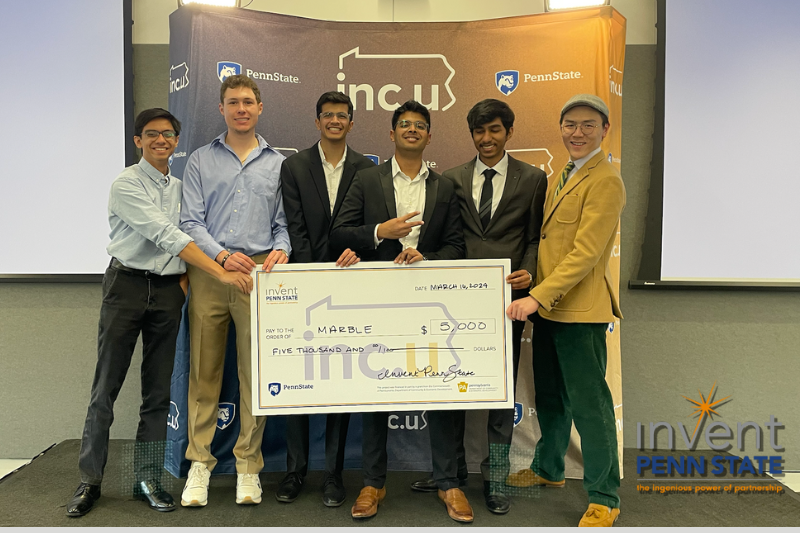By Holly Riddle

Penn State’s annual Startup Week highlights a range of amazing Happy Valley startups, many of whom share that Penn State’s resources have made their entrepreneurial journeys possible. That’s the case for Mehul Aggarwal, one of the founders of Marble.
As part of our ongoing series on Startup Week startups, we caught up with Aggarwal to learn more about the AI-powered platform and how it could change mental health, plus its next steps following Marble’s $5,000 win in the Invent Penn State Inc.U Competition.
Being at Penn State really helped out — with the opportunities that Penn State has and overall the amount of resources and the network that Penn State has, especially the alumni network. I’m able to reach out and set up meetings by saying “I’m a Penn State student. I’m currently working on this. If you could help me out, that would be amazing.”
Tell us a little bit about your background and how it led to Marble.
I’m currently majoring in data science with a minor in business administration. Most of the team who works for [Marble] ranges in backgrounds, from computer science to data science and neuropsychology and neuroscience and psychology — we have people from various backgrounds.
Marble came into play when I was just brainstorming with a friend, trying to find new ideas. I really love building startups and working on new and interesting things. Our initial idea was supposed to be something pretty different from what we have right now. It was supposed to be something that helps patients go to therapy and track their progress between sessions. Now, after we’ve talked to therapists, and [done] customer discovery, we’ve learned there’s a way for us to help people without targeting the therapy industry. Marble helps people be a better version of themselves through journaling, and gives them better insights into their daily lives.
And how does it work?
Marble is basically a mobile application where people can journal through various methods. The most unique method that we have right now is journaling through conversation. It’s almost like you’re talking to a friend, but at the same time, you’re working on yourself and working on self-development.
The app is AI-powered, correct? How do you feel you’re using AI in a positive way?
There’s big controversy about how AI can be bad or good and I’m not going to get too much into that, but, the way we are using AI is helping people better understand themselves. The AI isn’t giving people suggestions on its own. It’s just helping people talk about their day, helping people provide specific insights into their daily life, which users in general might struggle to do.
Why did you think Marble was a concept that could be successful?
There are a lot of journaling apps out there. With my background in technology and my passion for AI and building new things, and overall love [for] helping people, [I was] trying to combine [it all] into one, while building a mobile app that fills a gap in the marketplace.
Other apps focus on something called prompt journaling, which is not that intuitive and it’s still very hard for you to stay engaged over longer periods of time. We’ve introduced something unique. It’s easy journaling for everyone. However you want to journal — if you want to journal through voice and record your day through voice — whatever you want to do, we give you that format to do it, so [you can] make journaling a habit, which is beneficial.
What do you think contributed to Marble’s success at Inc.U?
Honestly, all the competitors had great products, great services, whatever they were offering. Personally, I think one thing that made Marble really stand out was that we have beta testing already out and we had 50-plus data users already testing out our application at the time. We literally just launched it a few days before the Inc.U competition. And in that short period, we ended up getting a very high number of beta testers. We also ended up doing a lot of market research and were really [sure] about where we wanted to stand in the industry and… how we would gather more customers.
To what extent do you feel being at Penn State helped you get this startup off the ground?
Being at Penn State really helped out — with the opportunities that Penn State has and overall the amount of resources and the network that Penn State has, especially the alumni network. I’m able to reach out and set up meetings by saying “I’m a Penn State student. I’m currently working on this. If you could help me out, that would be amazing.”
Interested in learning more about Marble? You can sign up to beta test the AI-powered journaling platform at https://www.marblejournal.app/.

